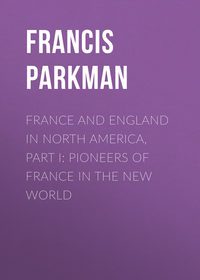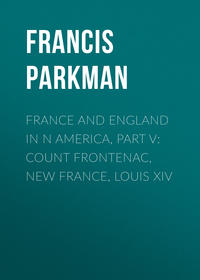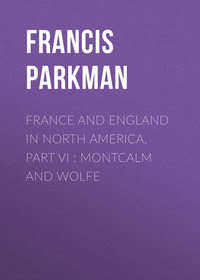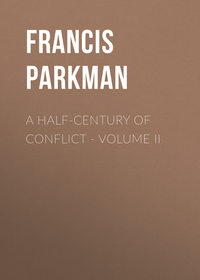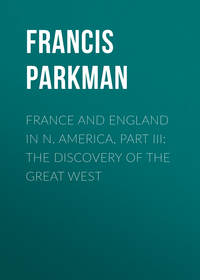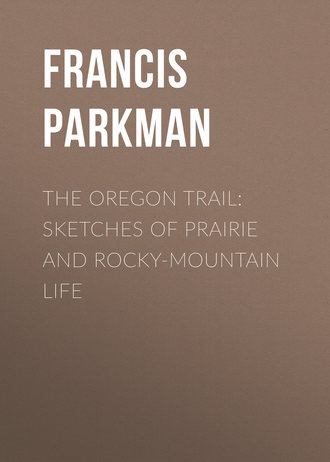 полная версия
полная версияThe Oregon Trail: Sketches of Prairie and Rocky-Mountain Life
Fort Leavenworth was about forty miles distant, and thither I determined to follow him. I made up my mind to spend a solitary and supperless night, and then set out again in the morning. One hope, however, remained. The creek where the wagon had stuck was just before us; Pontiac might be thirsty with his run, and stop there to drink. I kept as near to him as possible, taking every precaution not to alarm him again; and the result proved as I had hoped: for he walked deliberately among the trees, and stooped down to the water. I alighted, dragged old Hendrick through the mud, and with a feeling of infinite satisfaction picked up the slimy trail-rope and twisted it three times round my hand. “Now let me see you get away again!” I thought, as I remounted. But Pontiac was exceedingly reluctant to turn back; Hendrick, too, who had evidently flattered himself with vain hopes, showed the utmost repugnance, and grumbled in a manner peculiar to himself at being compelled to face about. A smart cut of the whip restored his cheerfulness; and dragging the recovered truant behind, I set out in search of the camp. An hour or two elapsed, when, near sunset, I saw the tents, standing on a rich swell of the prairie, beyond a line of woods, while the bands of horses were feeding in a low meadow close at hand. There sat Jack C., cross-legged, in the sun, splicing a trail-rope, and the rest were lying on the grass, smoking and telling stories. That night we enjoyed a serenade from the wolves, more lively than any with which they had yet favored us; and in the morning one of the musicians appeared, not many rods from the tents, quietly seated among the horses, looking at us with a pair of large gray eyes; but perceiving a rifle leveled at him, he leaped up and made off in hot haste.
I pass by the following day or two of our journey, for nothing occurred worthy of record. Should any one of my readers ever be impelled to visit the prairies, and should he choose the route of the Platte (the best, perhaps, that can be adopted), I can assure him that he need not think to enter at once upon the paradise of his imagination. A dreary preliminary, protracted crossing of the threshold awaits him before he finds himself fairly upon the verge of the “great American desert,” those barren wastes, the haunts of the buffalo and the Indian, where the very shadow of civilization lies a hundred leagues behind him. The intervening country, the wide and fertile belt that extends for several hundred miles beyond the extreme frontier, will probably answer tolerably well to his preconceived ideas of the prairie; for this it is from which picturesque tourists, painters, poets, and novelists, who have seldom penetrated farther, have derived their conceptions of the whole region. If he has a painter’s eye, he may find his period of probation not wholly void of interest. The scenery, though tame, is graceful and pleasing. Here are level plains, too wide for the eye to measure green undulations, like motionless swells of the ocean; abundance of streams, followed through all their windings by lines of woods and scattered groves. But let him be as enthusiastic as he may, he will find enough to damp his ardor. His wagons will stick in the mud; his horses will break loose; harness will give way, and axle-trees prove unsound. His bed will be a soft one, consisting often of black mud, of the richest consistency. As for food, he must content himself with biscuit and salt provisions; for strange as it may seem, this tract of country produces very little game. As he advances, indeed, he will see, moldering in the grass by his path, the vast antlers of the elk, and farther on, the whitened skulls of the buffalo, once swarming over this now deserted region. Perhaps, like us, he may journey for a fortnight, and see not so much as the hoof-print of a deer; in the spring, not even a prairie hen is to be had.
Yet, to compensate him for this unlooked-for deficiency of game, he will find himself beset with “varmints” innumerable. The wolves will entertain him with a concerto at night, and skulk around him by day, just beyond rifle shot; his horse will step into badger-holes; from every marsh and mud puddle will arise the bellowing, croaking, and trilling of legions of frogs, infinitely various in color, shape and dimensions. A profusion of snakes will glide away from under his horse’s feet, or quietly visit him in his tent at night; while the pertinacious humming of unnumbered mosquitoes will banish sleep from his eyelids. When thirsty with a long ride in the scorching sun over some boundless reach of prairie, he comes at length to a pool of water, and alights to drink, he discovers a troop of young tadpoles sporting in the bottom of his cup. Add to this, that all the morning the hot sun beats upon him with sultry, penetrating heat, and that, with provoking regularity, at about four o’clock in the afternoon, a thunderstorm rises and drenches him to the skin. Such being the charms of this favored region, the reader will easily conceive the extent of our gratification at learning that for a week we had been journeying on the wrong track! How this agreeable discovery was made I will presently explain.
One day, after a protracted morning’s ride, we stopped to rest at noon upon the open prairie. No trees were in sight; but close at hand, a little dribbling brook was twisting from side to side through a hollow; now forming holes of stagnant water, and now gliding over the mud in a scarcely perceptible current, among a growth of sickly bushes, and great clumps of tall rank grass. The day was excessively hot and oppressive. The horses and mules were rolling on the prairie to refresh themselves, or feeding among the bushes in the hollow. We had dined; and Delorier, puffing at his pipe, knelt on the grass, scrubbing our service of tin plate. Shaw lay in the shade, under the cart, to rest for a while, before the word should be given to “catch up.” Henry Chatillon, before lying down, was looking about for signs of snakes, the only living things that he feared, and uttering various ejaculations of disgust, at finding several suspicious-looking holes close to the cart. I sat leaning against the wheel in a scanty strip of shade, making a pair of hobbles to replace those which my contumacious steed Pontiac had broken the night before. The camp of our friends, a rod or two distant, presented the same scene of lazy tranquillity.
“Hallo!” cried Henry, looking up from his inspection of the snake-holes, “here comes the old captain!”
The captain approached, and stood for a moment contemplating us in silence.
“I say, Parkman,” he began, “look at Shaw there, asleep under the cart, with the tar dripping off the hub of the wheel on his shoulder!”
At this Shaw got up, with his eyes half opened, and feeling the part indicated, he found his hand glued fast to his red flannel shirt.
“He’ll look well when he gets among the squaws, won’t he?” observed the captain, with a grin.
He then crawled under the cart, and began to tell stories of which his stock was inexhaustible. Yet every moment he would glance nervously at the horses. At last he jumped up in great excitement. “See that horse! There—that fellow just walking over the hill! By Jove; he’s off. It’s your big horse, Shaw; no it isn’t, it’s Jack’s! Jack! Jack! hallo, Jack!” Jack thus invoked, jumped up and stared vacantly at us.
“Go and catch your horse, if you don’t want to lose him!” roared the captain.
Jack instantly set off at a run through the grass, his broad pantaloons flapping about his feet. The captain gazed anxiously till he saw that the horse was caught; then he sat down, with a countenance of thoughtfulness and care.
“I tell you what it is,” he said, “this will never do at all. We shall lose every horse in the band someday or other, and then a pretty plight we should be in! Now I am convinced that the only way for us is to have every man in the camp stand horse-guard in rotation whenever we stop. Supposing a hundred Pawnees should jump up out of that ravine, all yelling and flapping their buffalo robes, in the way they do? Why, in two minutes not a hoof would be in sight.” We reminded the captain that a hundred Pawnees would probably demolish the horse-guard, if he were to resist their depredations.
“At any rate,” pursued the captain, evading the point, “our whole system is wrong; I’m convinced of it; it is totally unmilitary. Why, the way we travel, strung out over the prairie for a mile, an enemy might attack the foremost men, and cut them off before the rest could come up.”
“We are not in an enemy’s country, yet,” said Shaw; “when we are, we’ll travel together.”
“Then,” said the captain, “we might be attacked in camp. We’ve no sentinels; we camp in disorder; no precautions at all to guard against surprise. My own convictions are that we ought to camp in a hollow square, with the fires in the center; and have sentinels, and a regular password appointed for every night. Besides, there should be vedettes, riding in advance, to find a place for the camp and give warning of an enemy. These are my convictions. I don’t want to dictate to any man. I give advice to the best of my judgment, that’s all; and then let people do as they please.”
We intimated that perhaps it would be as well to postpone such burdensome precautions until there should be some actual need of them; but he shook his head dubiously. The captain’s sense of military propriety had been severely shocked by what he considered the irregular proceedings of the party; and this was not the first time he had expressed himself upon the subject. But his convictions seldom produced any practical results. In the present case, he contented himself, as usual, with enlarging on the importance of his suggestions, and wondering that they were not adopted. But his plan of sending out vedettes seemed particularly dear to him; and as no one else was disposed to second his views on this point, he took it into his head to ride forward that afternoon, himself.
“Come, Parkman,” said he, “will you go with me?”
We set out together, and rode a mile or two in advance. The captain, in the course of twenty years’ service in the British army, had seen something of life; one extensive side of it, at least, he had enjoyed the best opportunities for studying; and being naturally a pleasant fellow, he was a very entertaining companion. He cracked jokes and told stories for an hour or two; until, looking back, we saw the prairie behind us stretching away to the horizon, without a horseman or a wagon in sight.
“Now,” said the captain, “I think the vedettes had better stop till the main body comes up.”
I was of the same opinion. There was a thick growth of woods just before us, with a stream running through them. Having crossed this, we found on the other side a fine level meadow, half encircled by the trees; and fastening our horses to some bushes, we sat down on the grass; while, with an old stump of a tree for a target, I began to display the superiority of the renowned rifle of the back woods over the foreign innovation borne by the captain. At length voices could be heard in the distance behind the trees.
“There they come!” said the captain: “let’s go and see how they get through the creek.”
We mounted and rode to the bank of the stream, where the trail crossed it. It ran in a deep hollow, full of trees; as we looked down, we saw a confused crowd of horsemen riding through the water; and among the dingy habiliment of our party glittered the uniforms of four dragoons.
Shaw came whipping his horse up the back, in advance of the rest, with a somewhat indignant countenance. The first word he spoke was a blessing fervently invoked on the head of R., who was riding, with a crest-fallen air, in the rear. Thanks to the ingenious devices of the gentleman, we had missed the track entirely, and wandered, not toward the Platte, but to the village of the Iowa Indians. This we learned from the dragoons, who had lately deserted from Fort Leavenworth. They told us that our best plan now was to keep to the northward until we should strike the trail formed by several parties of Oregon emigrants, who had that season set out from St. Joseph’s in Missouri.
In extremely bad temper, we encamped on this ill-starred spot; while the deserters, whose case admitted of no delay rode rapidly forward. On the day following, striking the St. Joseph’s trail, we turned our horses’ heads toward Fort Laramie, then about seven hundred miles to the westward.
CHAPTER V
“THE BIG BLUE”The great medley of Oregon and California emigrants, at their camps around Independence, had heard reports that several additional parties were on the point of setting out from St. Joseph’s farther to the northward. The prevailing impression was that these were Mormons, twenty-three hundred in number; and a great alarm was excited in consequence. The people of Illinois and Missouri, who composed by far the greater part of the emigrants, have never been on the best terms with the “Latter Day Saints”; and it is notorious throughout the country how much blood has been spilt in their feuds, even far within the limits of the settlements. No one could predict what would be the result, when large armed bodies of these fanatics should encounter the most impetuous and reckless of their old enemies on the broad prairie, far beyond the reach of law or military force. The women and children at Independence raised a great outcry; the men themselves were seriously alarmed; and, as I learned, they sent to Colonel Kearny, requesting an escort of dragoons as far as the Platte. This was refused; and as the sequel proved, there was no occasion for it. The St. Joseph’s emigrants were as good Christians and as zealous Mormon-haters as the rest; and the very few families of the “Saints” who passed out this season by the route of the Platte remained behind until the great tide of emigration had gone by; standing in quite as much awe of the “gentiles” as the latter did of them.
We were now, as I before mentioned, upon this St. Joseph’s trail. It was evident, by the traces, that large parties were a few days in advance of us; and as we too supposed them to be Mormons, we had some apprehension of interruption.
The journey was somewhat monotonous. One day we rode on for hours, without seeing a tree or a bush; before, behind, and on either side, stretched the vast expanse, rolling in a succession of graceful swells, covered with the unbroken carpet of fresh green grass. Here and there a crow, or a raven, or a turkey-buzzard, relieved the uniformity.
“What shall we do to-night for wood and water?” we began to ask of each other; for the sun was within an hour of setting. At length a dark green speck appeared, far off on the right; it was the top of a tree, peering over a swell of the prairie; and leaving the trail, we made all haste toward it. It proved to be the vanguard of a cluster of bushes and low trees, that surrounded some pools of water in an extensive hollow; so we encamped on the rising ground near it.
Shaw and I were sitting in the tent, when Delorier thrust his brown face and old felt hat into the opening, and dilating his eyes to their utmost extent, announced supper. There were the tin cups and the iron spoons, arranged in military order on the grass, and the coffee-pot predominant in the midst. The meal was soon dispatched; but Henry Chatillon still sat cross-legged, dallying with the remnant of his coffee, the beverage in universal use upon the prairie, and an especial favorite with him. He preferred it in its virgin flavor, unimpaired by sugar or cream; and on the present occasion it met his entire approval, being exceedingly strong, or, as he expressed it, “right black.”
It was a rich and gorgeous sunset—an American sunset; and the ruddy glow of the sky was reflected from some extensive pools of water among the shadowy copses in the meadow below.
“I must have a bath to-night,” said Shaw. “How is it, Delorier? Any chance for a swim down here?”
“Ah! I cannot tell; just as you please, monsieur,” replied Delorier, shrugging his shoulders, perplexed by his ignorance of English, and extremely anxious to conform in all respects to the opinion and wishes of his bourgeois.
“Look at his moccasion,” said I. “It has evidently been lately immersed in a profound abyss of black mud.”
“Come,” said Shaw; “at any rate we can see for ourselves.”
We set out together; and as we approached the bushes, which were at some distance, we found the ground becoming rather treacherous. We could only get along by stepping upon large clumps of tall rank grass, with fathomless gulfs between, like innumerable little quaking islands in an ocean of mud, where a false step would have involved our boots in a catastrophe like that which had befallen Delorier’s moccasins. The thing looked desperate; we separated, so as to search in different directions, Shaw going off to the right, while I kept straight forward. At last I came to the edge of the bushes: they were young waterwillows, covered with their caterpillar-like blossoms, but intervening between them and the last grass clump was a black and deep slough, over which, by a vigorous exertion, I contrived to jump. Then I shouldered my way through the willows, tramping them down by main force, till I came to a wide stream of water, three inches deep, languidly creeping along over a bottom of sleek mud. My arrival produced a great commotion. A huge green bull-frog uttered an indignant croak, and jumped off the bank with a loud splash: his webbed feet twinkled above the surface, as he jerked them energetically upward, and I could see him ensconcing himself in the unresisting slime at the bottom, whence several large air bubbles struggled lazily to the top. Some little spotted frogs instantly followed the patriarch’s example; and then three turtles, not larger than a dollar, tumbled themselves off a broad “lily pad,” where they had been reposing. At the same time a snake, gayly striped with black and yellow, glided out from the bank, and writhed across to the other side; and a small stagnant pool into which my foot had inadvertently pushed a stone was instantly alive with a congregation of black tadpoles.
“Any chance for a bath, where you are?” called out Shaw, from a distance.
The answer was not encouraging. I retreated through the willows, and rejoining my companion, we proceeded to push our researches in company. Not far on the right, a rising ground, covered with trees and bushes, seemed to sink down abruptly to the water, and give hope of better success; so toward this we directed our steps. When we reached the place we found it no easy matter to get along between the hill and the water, impeded as we were by a growth of stiff, obstinate young birch-trees, laced together by grapevines. In the twilight, we now and then, to support ourselves, snatched at the touch-me-not stem of some ancient sweet-brier. Shaw, who was in advance, suddenly uttered a somewhat emphatic monosyllable; and looking up I saw him with one hand grasping a sapling, and one foot immersed in the water, from which he had forgotten to withdraw it, his whole attention being engaged in contemplating the movements of a water-snake, about five feet long, curiously checkered with black and green, who was deliberately swimming across the pool. There being no stick or stone at hand to pelt him with, we looked at him for a time in silent disgust; and then pushed forward. Our perseverence was at last rewarded; for several rods farther on, we emerged upon a little level grassy nook among the brushwood, and by an extraordinary dispensation of fortune, the weeds and floating sticks, which elsewhere covered the pool, seemed to have drawn apart, and left a few yards of clear water just in front of this favored spot. We sounded it with a stick; it was four feet deep; we lifted a specimen in our cupped hands; it seemed reasonably transparent, so we decided that the time for action was arrived. But our ablutions were suddenly interrupted by ten thousand punctures, like poisoned needles, and the humming of myriads of over-grown mosquitoes, rising in all directions from their native mud and slime and swarming to the feast. We were fain to beat a retreat with all possible speed.
We made toward the tents, much refreshed by the bath which the heat of the weather, joined to our prejudices, had rendered very desirable.
“What’s the matter with the captain? look at him!” said Shaw. The captain stood alone on the prairie, swinging his hat violently around his head, and lifting first one foot and then the other, without moving from the spot. First he looked down to the ground with an air of supreme abhorrence; then he gazed upward with a perplexed and indignant countenance, as if trying to trace the flight of an unseen enemy. We called to know what was the matter; but he replied only by execrations directed against some unknown object. We approached, when our ears were saluted by a droning sound, as if twenty bee-hives had been overturned at once. The air above was full of large black insects, in a state of great commotion, and multitudes were flying about just above the tops of the grass blades.
“Don’t be afraid,” called the captain, observing us recoil. “The brutes won’t sting.”
At this I knocked one down with my hat, and discovered him to be no other than a “dorbug”; and looking closer, we found the ground thickly perforated with their holes.
We took a hasty leave of this flourishing colony, and walking up the rising ground to the tents, found Delorier’s fire still glowing brightly. We sat down around it, and Shaw began to expatiate on the admirable facilities for bathing that we had discovered, and recommended the captain by all means to go down there before breakfast in the morning. The captain was in the act of remarking that he couldn’t have believed it possible, when he suddenly interrupted himself, and clapped his hand to his cheek, exclaiming that “those infernal humbugs were at him again.” In fact, we began to hear sounds as if bullets were humming over our heads. In a moment something rapped me sharply on the forehead, then upon the neck, and immediately I felt an indefinite number of sharp wiry claws in active motion, as if their owner were bent on pushing his explorations farther. I seized him, and dropped him into the fire. Our party speedily broke up, and we adjourned to our respective tents, where, closing the opening fast, we hoped to be exempt from invasion. But all precaution was fruitless. The dorbugs hummed through the tent, and marched over our faces until day-light; when, opening our blankets, we found several dozen clinging there with the utmost tenacity. The first object that met our eyes in the morning was Delorier, who seemed to be apostrophizing his frying-pan, which he held by the handle at arm’s length. It appeared that he had left it at night by the fire; and the bottom was now covered with dorbugs, firmly imbedded. Multitudes beside, curiously parched and shriveled, lay scattered among the ashes.
The horses and mules were turned loose to feed. We had just taken our seats at breakfast, or rather reclined in the classic mode, when an exclamation from Henry Chatillon, and a shout of alarm from the captain, gave warning of some casualty, and looking up, we saw the whole band of animals, twenty-three in number, filing off for the settlements, the incorrigible Pontiac at their head, jumping along with hobbled feet, at a gait much more rapid than graceful. Three or four of us ran to cut them off, dashing as best we might through the tall grass, which was glittering with myriads of dewdrops. After a race of a mile or more, Shaw caught a horse. Tying the trail-rope by way of bridle round the animal’s jaw, and leaping upon his back, he got in advance of the remaining fugitives, while we, soon bringing them together, drove them in a crowd up to the tents, where each man caught and saddled his own. Then we heard lamentations and curses; for half the horses had broke their hobbles, and many were seriously galled by attempting to run in fetters.
It was late that morning before we were on the march; and early in the afternoon we were compelled to encamp, for a thunder-gust came up and suddenly enveloped us in whirling sheets of rain. With much ado, we pitched our tents amid the tempest, and all night long the thunder bellowed and growled over our heads. In the morning, light peaceful showers succeeded the cataracts of rain, that had been drenching us through the canvas of our tents. About noon, when there were some treacherous indications of fair weather, we got in motion again.


